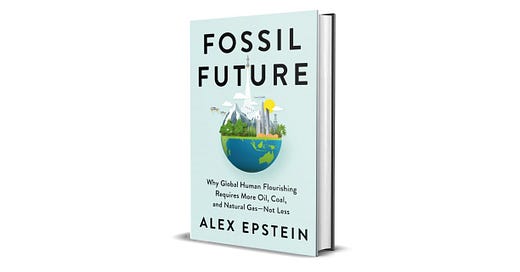A couple weeks ago, Tyler reviewed Alex Epstein’s Fossil Future. Tyler:
I view the steelmanned case as this: we cannot simply keep on producing increasing amounts of carbon emissions for centuries on end. We thus need some trajectory where — at a pace we can debate — carbon emissions end up declining. I’ve stressed on MR many times that climate change is not in fact an existential risk, but it could be a civilization-destroying risk if we just keep on boosting carbon emissions without end. I don’t know a serious scientist who takes issue with that claim.
And:
Epstein focuses on the Burkina Faso sort of issue, and buries the long-term risk of no real adjustment. But we do have to adjust. Why could he not have had the subtitle: “Why Global Human Flourishing Requires More Oil, Coal, and Natural Gas for a while, and Then Less”? Then I would be happier. In economic language, you could say he is not considering enough of the margins.
Now Epstein has replied at great length. A few highlights:
Given that Fossil Future 1) argues for increasing fossil fuel use over the next several decades, not centuries, 2) provides principles for deciding on pro-human energy/climate policies in the future, and 3) advocates policies in the meantime to maximize the growth of cost-effective alternatives to fossil fuels, you would expect Tyler’s critical comments to address and refute one or more of these arguments.
Instead, he 1) bizarrely portrays Fossil Future’s position as “keep on boosting carbon emissions without end,” and treats (2) and (3) as nonexistent even though they are crucial to the book’s argument.
And:
But what Tyler calls “very weak” experts are, as I explain at length in the book, chosen because they are “designated experts”—those who are treated by mainstream knowledge institutions as spokespeople for all experts.
More:
But the mainstream discussion of fossil fuels does not remotely involve “a pace we can debate.” It involves established international agreements that have decided on exactly the pace Fossil Future criticizes: net-zero CO2 emissions, or very close to it, by 2050. No mainstream institutions are saying “net-zero by 2250” (which Fossil Future argues is entirely possible if we decriminalize nuclear energy).
Also:
Fear of being marginalized is often operative because if one agrees with a powerful challenge to the establishment, one is in the position of being morally obligated to criticize the establishment position—something which, especially in the case of fossil fuels and climate, can carry with it a host of negative professional consequences. For example, if establishment-friendly commentators join me in condemning the “net zero by 2050 movement” as a mortal threat to humanity’s future, they will incur a lot of ire and quite possibly lose a lot of status. But if they softman Fossil Future’s powerful exposé of the establishment’s “net zero by 2050” position, and instead treat the position as merely some emissions reduction over some extended timetable, they avoid the career-threatening ire of the energy/climate establishment.
My overall reaction: While I wish Alex had written a more concise point-by-point reply, Tyler definitely did not read Alex carefully. Consider this passage from Fossil Future, pp.321-2:
Since 1850, all of fossil-fueled civilization has increased the amount of CO2 in the atmosphere from just under 0.03 percent—280 parts per million—to just over 0.04 percent—420 parts per million.
By many estimates the height of CO2 levels was above 6,000 parts per million—almost fifteen times today’s level.
To get to even 1,500 parts per million—one quarter of the high—would require us to continue increasing emissions far into the 2100s—well past the point at which we can expect to have ultra-cost-effective non-carbon nuclear energy.
Thus there is no near-term mechanism of getting anywhere close to even average historical CO2 levels—let alone to far higher levels where life on Earth flourished for millions of years.
Furthermore, Alex actually concedes too much to Tyler, since Fossil Future powerfully argues that (a) it’s unclear that the environmental effects of fossil fuels are even gross negatives, and (b) there is overwhelming evidence that - thanks to climate mastery - the net environmental effects of fossil fuels are highly positive. So contra Tyler, there really is no need to water down the subtitle of the book.





I can sympathize with the desire for a shorter rebuttal.
The reason I approached it in the (long) way I did is that the essence of what Tyler did was not argue against me, but rather severely misrepresent my view as well as the mainstream view my book focuses its opposition on. For me to claim that a highly respected economist is distorting things to this extent is to make a serious, and to many implausible, accusation. The only way I could think of to make good on it was to give abundant primary source references to Fossil Future doing the exact opposite of what Tyler says.
Re: wanting a point-by-point response, as I explained in my piece, Tyler's "points" were almost exclusively either 1) responses to his own distortions of what I wrote or 2) empty dismissals, confidently delivered due to having already strawmanned/written-off my argument. So there was not really anything to respond to. I did a kind of point-by-point in my piece, but it was to highlight the distortion/dismissal tactic.
It's sad that a guy as smart as Tyler not only 1) irresponsibly commented on a book he was not willing to read carefully, but also 2) refused to admit any wrongdoing whatsoever.
I read Tyler Cowen's critique and then Alex Epstein's rebuttal.
Epstein was persuasive, and I think Cowen should either admit his errors in reviewing the book or put forth some other evidence from the book to counter Epstein.